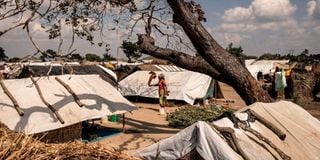Millions in urgent need of aid in Mozambique's Cabo Delgado Province

A woman shakes out her laundry in the Internally Displaced Person camp '25 de junho', in Metuge on May 20, 2021. 25 de junho' is one of the most populated Internally Displaced Person camp in Cabo Delgado Province.
What you need to know:
- According to the WHO, some $3.5 million is needed to provide health assistance, including emergency treatment for common illnesses and deliveries for expectant mothers.
More than 1.2 million people urgently need health assistance in Cabo Delgado Province in northern Mozambique, the World Health Organization (WHO) said Friday in a statement, signaling a further burden on a region already pummeled by an insurgency.
According to the WHO, some $3.5 million is needed to provide health assistance, including emergency treatment for common illnesses and deliveries for expectant mothers.
“We call for increased donor support to provide critical health services and other relief supplies that are desperately needed,” WHO Regional Director for Africa Dr Matshidiso Moeti as saying.
“The plight of thousands of families is worsening, and many of the violence-affected people depend on humanitarian aid for survival. We must swiftly step-up assistance to save lives and alleviate suffering.”
Violence and insecurity have damaged or forced shut nearly a third of the province’s 132 health facilities, depriving communities of basic health services and sparking emergency health needs for HIV, malaria and tuberculosis treatment as well as vaccination and safe delivery among internally displaced persons and host communities.
Cholera prevention, Covid-19 response and provision of mental and psychosocial health services are also critically needed.
Armed attacks
Humanitarian needs have increased following the armed attacks in March in Cabo Delgado’s Palma District that forced 52 000 people to flee their homes.
Cabo Delgado has been affected by recurrent armed attacks since 2017. The province was also affected by Cyclone Kenneth in 2019 that destroyed infrastructure, including health facilities. The disaster was worsened by cholera and measles outbreaks, with the Covid-19 pandemic adding to the health challenges.
Mozambique’s Cabo Delgado province is seen as volatile following several attacks in the region.
The attacks began in October 2017 on police stations in Mocimboa da Praia District, then spread to other districts in the northern part of Cabo Delgado, notably in Macomia, Palma and Nangade.
Islamic State-linked militants launched attacks on the northeastern coastal town of Palma on March 24, ransacked buildings and beheaded civilians. Thousands of people fled into the surrounding forest. The attack has seen a surge in the number of refugees fleeing the violence in the area.
Known locally as Al-Shabaab – but with no relation to the Somali group of the same name – the militants in Cabo Delgado have launched a series of brazen raids on towns and villages in an apparent bid to establish an Islamic caliphate.
UN worried
On Tuesday, the UN Refugee Agency said it was deeply concerned by ongoing reports of people fleeing Mozambique’s volatile Cabo Delgado province being forcibly returned after crossing into Tanzania.
Some 724,000 people have been forcibly displaced since the conflict started, the UNHCR said Tuesday.
The northern Mozambique border area where those returned from Tanzania are currently sheltering is remote and extremely difficult to access.
“UNHCR and partners have received worrying reports – including direct testimonies – that several thousand Mozambicans have been pushed back from Tanzania into northern Mozambique since last year”.
This includes reports of over 1,500 returned this month, the UNHCR, United Nations High Commissioner for Refugees quoted its spokesperson Mr Boris Cheshirkov as saying in a statement.
During an inter-agency mission in April to the Negomano border point in Mozambique, UNHCR and partners learned that most of the Mozambicans sheltering there had hoped to find refuge in Tanzania after fleeing deadly attacks by non-state armed groups in Palma in March.





